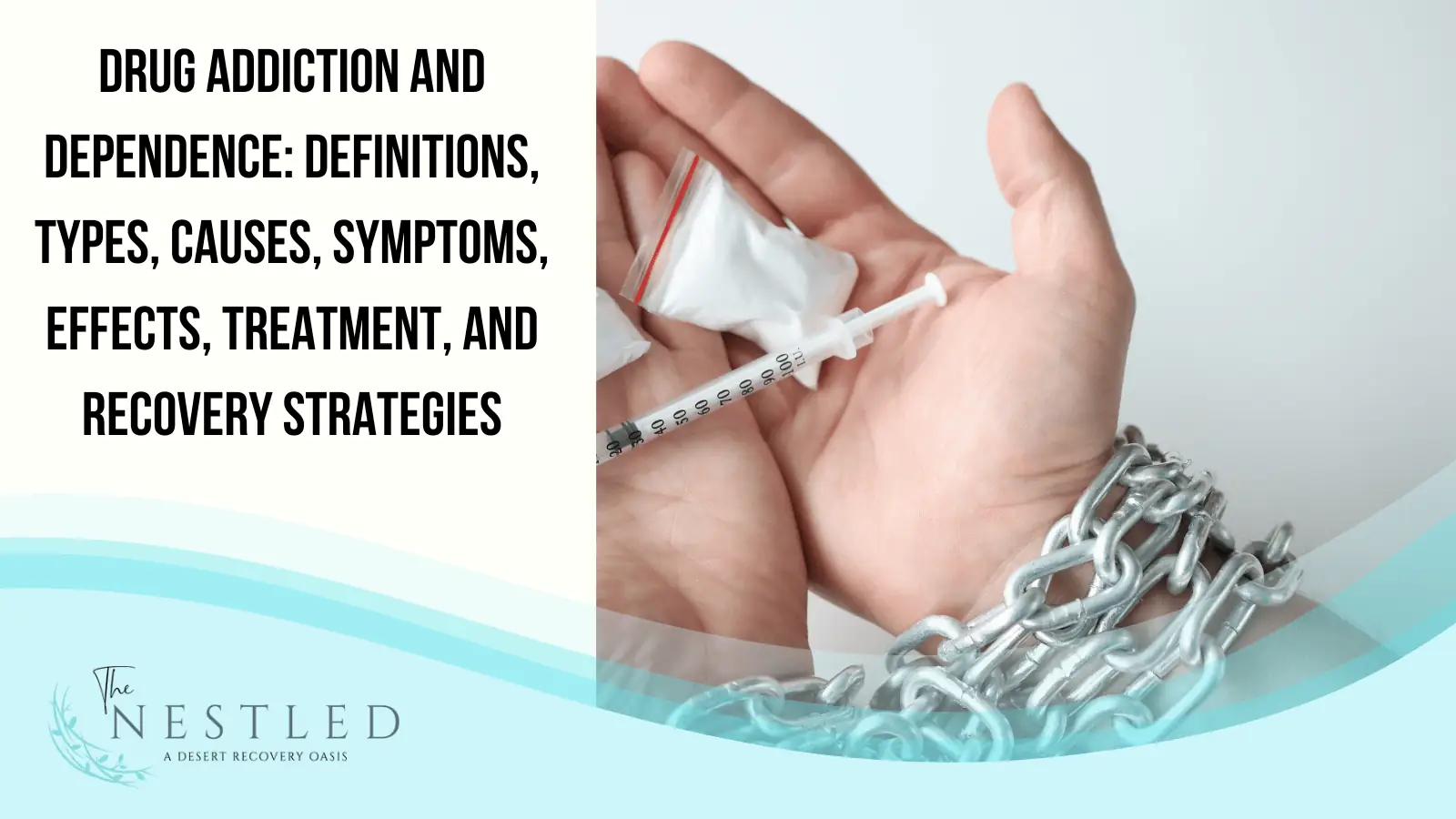Drug addiction refers to the chronic and compulsive use of substances despite adverse consequences, while drug dependence encompasses the physiological and psychological reliance on a drug. These two terms are often intertwined, as individuals may experience physical and psychological dependence simultaneously.
Factors such as environmental, biological, genetic, and psychological factors contribute to the development of drug addiction and dependence.
Common symptoms of drug addiction and drug dependence include cravings, loss of control, tolerance, withdrawal symptoms, and continued drug use despite negative outcomes.
What is the difference between drug addiction and dependence?
Drug addiction is a complex condition that goes beyond just the physical effects of drug use. It’s characterized by a strong, often uncontrollable, urge to use drugs despite experiencing negative consequences.
People struggling with drug addiction find it difficult to control their drug use, and it can have a huge impact on their personal lives, relationships, health, and overall well-being. Addiction is driven by the brain’s reward system, which leads to a powerful desire for the drug and makes it challenging to quit or cut back, even when they want to.
In contrast, drug dependence is primarily a physiological response that occurs as a result of repeated drug use. When someone becomes dependent on a drug, their body adapts to its presence. This adaptation can lead to tolerance, meaning that higher doses of the drug are needed to achieve the same effect. When drug use is reduced or stopped, withdrawal symptoms can occur. These symptoms can range from physical discomfort to emotional and psychological distress.
Contrary to popular opinion, drug addiction, and drug dependence are distinct concepts. While they often occur together, someone can be dependent on a drug without meeting the criteria for addiction, and vice versa.
Recognizing the difference between drug addiction and dependence is essential. This is because it helps healthcare professionals develop appropriate treatment strategies tailored to the situation of individuals dealing with drug-related issues.
How does drug addiction lead to dependence?
Drug addiction can lead to dependence through a series of interconnected processes that involve changes in brain chemistry, the development of tolerance, and the experience of withdrawal symptoms when the drug is discontinued.
When a person engages in drug use, particularly with substances that have addictive properties, such as opioids, stimulants, or sedatives, the drugs interact with the brain’s reward system. This system is responsible for regulating feelings of pleasure and reinforcing behaviors necessary for survival. The drugs stimulate the release of neurotransmitters, such as dopamine, which create a pleasurable sensation.
Over time, continued drug use can disrupt the normal functioning of the reward system. The brain adapts to the presence of the drug by reducing its sensitivity to dopamine and other neurotransmitters. As a result, the person may no longer experience the same level of pleasure or euphoria from the drug as they did initially. This is known as tolerance.
To counteract the diminished effects, individuals may increase their drug dosage or frequency of use in an attempt to achieve the desired high. This escalation in drug use further reinforces the addictive behavior and contributes to the development of dependence.
As dependence takes hold, the brain becomes reliant on the presence of the drug to maintain normal functioning. The body adapts to the drug’s presence, and sudden reduction or cessation of drug use can trigger a range of physical and psychological withdrawal symptoms. These symptoms can vary depending on the drug and may include nausea, sweating, insomnia, anxiety, irritability, and intense drug cravings.
The cycle of drug addiction and dependence becomes self-perpetuating. The individual may continue to use the drug to avoid or alleviate the distressing withdrawal symptoms, reinforcing the pattern of dependence and addiction.
Note that not everyone who uses drugs will develop dependence. Factors such as the type of drug, frequency, and duration of use, individual biology, and genetic predisposition can influence the likelihood of developing dependence. However, drug addiction can increase the risk of progressing to dependence.
What are the types of drug addiction?
Drug addiction has various types depending on the specific substances involved. Here are some common types of drug addiction:
1. Opioids
Opioid addiction involves drugs such as heroin, morphine, and prescription painkillers like oxycodone and hydrocodone. Opioids work by binding to opioid receptors in the brain, blocking pain signals and producing a sense of euphoria. Opioid addiction can quickly develop due to the drugs’ potent effects and the risk of physical dependence.
2. Stimulants
Stimulants increase alertness, energy, and focus by boosting levels of dopamine and norepinephrine in the brain. Prolonged use of stimulants can lead to addiction, which is characterized by intense cravings, increased tolerance, and potential psychological and physical health risks. Examples of stimulants are cocaine, amphetamines, and methamphetamine.
3. Sedatives and Tranquilizers
Sedatives are substances often prescribed to treat anxiety, insomnia, and seizures. They depress the central nervous system, thus inducing relaxation and sedation. Continued use can lead to dependence and withdrawal symptoms when use is reduced or stopped.
4. Hallucinogens
Hallucinogens alter perception, mood, and cognitive processes, often producing vivid sensory experiences. While they are not considered highly addictive in the traditional sense, psychological dependence and the potential for dangerous behaviors associated with their use can still occur.
5. Cannabis
Cannabis contains THC, a psychoactive compound that produces a range of effects, including relaxation, euphoria, and altered perception. Although cannabis addiction is generally less severe compared to other substances, heavy and prolonged use can lead to dependence and associated negative consequences.
Aside from the aforementioned, addiction can also occur with other substances, such as alcohol, nicotine, and prescription medications not mentioned here. Each type of drug addiction carries specific risks and potential complications, which include physical health issues, strained relationships, legal consequences, and impaired functioning in different areas of life.
What are the causes of drug addiction and dependence?
Drug addiction can result from a combination of various factors that interact and contribute to its development. Some common factors that can play a role include:
1. Genetic Predisposition
Certain genes can influence how the brain responds to drugs, making some individuals more vulnerable to developing addiction. Nevertheless, having a genetic predisposition does not guarantee addiction will occur, as environmental factors also play a significant role.
2. Environmental Influences
Factors such as exposure to drugs, availability of drugs in the community, and lack of parental supervision can increase the likelihood of substance use and subsequent addiction. In addition, experiencing trauma or stressful life events can contribute to the development of addiction as individuals may turn to drugs as a coping mechanism.
3. Social Factors
People are often influenced by their social circles, seeking acceptance and wanting to fit in. If peers engage in drug use, individuals may be more likely to experiment with substances and develop addiction. Social norms and cultural attitudes toward drug use can also impact an individual’s perception and acceptance of drug use.
4. Mental Health Conditions
There is a strong correlation between drug addiction and mental health conditions. Many individuals with mental health disorders, such as depression, anxiety, or post-traumatic stress disorder, turn to drugs as a means of self-medication. Substance use can temporarily alleviate symptoms, leading to a cycle of addiction and exacerbation of mental health issues.
5. Neurochemical Factors
Drugs interact with the brain’s reward system, hijacking the natural processes that regulate pleasure and motivation. Prolonged drug use can cause chemical imbalances in the brain, altering neurotransmitter levels and affecting mood, motivation, and decision-making. These changes contribute to the development of addiction.
6. Developmental Factors
Adolescents and young adults are particularly vulnerable as their brains are still developing, and the reward system is susceptible. Early drug use can disrupt brain development and increase the likelihood of addiction later in life.
What are the symptoms of drug addiction and dependence?
The symptoms of drug addiction can be grouped into three — behavioral, physical, and psychological symptoms. Let’s take a look at these symptoms below:
Behavioral Symptoms
- Inability to control or reduce drug use despite repeated attempts.
- Prioritizing drug use over important obligations, such as work, school, or family responsibilities.
- Decreased interest in activities that were once enjoyable, including hobbies or social engagements.
- Associating with new friends or groups who are primarily engaged in drug use.
Physical Symptoms
- Neglecting personal hygiene, sudden weight loss or gain, bloodshot eyes, or unexplained marks or bruises.
- Insomnia or excessive sleepiness.
- Impaired motor skills, unsteady gait, or tremors.
- Experiencing physical discomfort, such as nausea, sweating, shaking, or headaches, when attempting to reduce or stop drug use.
Psychological Symptoms
- Strong and persistent urges to use drugs, accompanied by obsessive thoughts about ob:0⁰zltaining and using them.
- Frequent mood swings, irritability, aggression, anxiety, or depression.
- Engaging in risky behaviors, making impulsive decisions, or experiencing difficulties with decision-making and problem-solving.
- Trouble with memory, attention, concentration, or overall cognitive functioning
If you or someone you know is exhibiting these symptoms, seeking professional help from healthcare providers or addiction specialists is necessary for accurate diagnosis, intervention, and appropriate treatment options.
How to treat drug addiction and dependence
Treating drug addiction and dependence generally requires an individualized approach. Some treatment methods that are commonly used include:
1. Medication-Assisted Treatment (MAT)
Medications, such as methadone, buprenorphine, or naltrexone, may be prescribed to help manage withdrawal symptoms, reduce cravings, and normalize brain chemistry. MAT is often used in combination with behavioral therapies to support recovery.
2. Behavioral Therapies
Various evidence-based behavioral therapies are effective in treating drug addiction. These therapies aim to modify attitudes, behaviors, and thought patterns related to drug use.
Examples include cognitive-behavioral therapy (CBT), contingency management, motivational interviewing, and family therapy; they help people with addiction to develop coping skills and promote relapse prevention.
3. Counseling and Psychotherapy
Individual or group counseling sessions provide a supportive and non-judgmental environment for individuals to explore underlying issues contributing to their addiction. Counseling helps individuals gain insight, develop healthy coping mechanisms, and build resilience.
4. Support Groups
Participation in support groups, such as 12-step programs like Narcotics Anonymous (NA) or SMART Recovery, can provide peer support, encouragement, and a sense of community. These groups offer a platform for individuals to share experiences, receive guidance, and maintain long-term recovery.
5. Rehabilitation Programs
Inpatient or outpatient rehabilitation programs offer structured treatment environments for individuals with more severe addictions or those requiring intensive support.
These programs provide a combination of therapy, counseling, education, and support services to address the physical, emotional, and social aspects of addiction.
How to overcome barriers to treatment of drug addiction and drug dependence
As a drug addict, overcoming barriers to treatment is important because it enables you to access the help you need. That said, the following are some usual barriers and how you can tackle them:
1. Stigma
The stigma associated with addiction can prevent individuals from seeking treatment due to fear of judgment or discrimination. To overcome this barrier:
- Educate yourself and others about addiction as a medical condition.
- Seek support from non-judgmental individuals, such as trusted friends, family members, or support groups.
- Engage in advocacy efforts to reduce stigma and promote understanding.
2. Lack of Access to Healthcare
- Research available treatment options and resources in your area, such as community health clinics, addiction treatment centers, or government-funded programs.
- Contact local helplines or hotlines to inquire about treatment options and financial assistance programs.
- Check out telemedicine options or online resources for remote access to healthcare professionals and support groups.
3. Financial Constraints
- Look into public health insurance programs, such as Medicaid or state-funded initiatives that cover addiction treatment.
- Inquire about sliding scale fees or payment plans offered by treatment centers or clinics.
- Seek out nonprofit organizations or foundations that provide financial assistance for addiction treatment.
4. Fear of Judgment and Disclosure
- Remember that seeking help for addiction is a courageous step towards recovery and personal well-being.
- Build a support network of understanding and non-judgmental individuals who can provide emotional support during the treatment process.
- Try out confidential treatment options or anonymous support groups, such as Alcoholics Anonymous (AA) or Narcotics Anonymous (NA).
How do the physical health consequences of long-term drug addiction compare to those of long-term alcohol addiction?
The physical health consequences of long-term drug addiction and alcohol addiction share similarities but also exhibit distinct differences. Both can lead to serious health issues such as liver damage, cardiovascular problems, and increased risk of infectious diseases.
However, long-term drug addiction may also result in specific health complications related to the route of administration (e.g., respiratory problems from smoking drugs) and the type of substance used (e.g., organ damage from intravenous drug use).
Conversely, long-term alcohol addiction is particularly associated with liver cirrhosis, pancreatitis, and neurological disorders such as Wernicke-Korsakoff syndrome. Overall, while there are overlapping health risks, the specific consequences may vary based on the substance of abuse and individual factors.
Take the First Step Towards Healing
To treat drug addiction and dependence, it is best to involve the expertise of qualified healthcare professionals. At The Nestled Recovery Center, we understand the challenges you face on your journey toward addiction recovery. That is why we’re here to support you every step of the way. Our compassionate team of experts is dedicated to providing personalized care, evidence-based treatments, and a safe, nurturing environment where you can find the strength to overcome addiction.
Are you or someone you know ready to fight drug addiction and dependence? If yes, then contact us today to get started with consultations and treatments.








